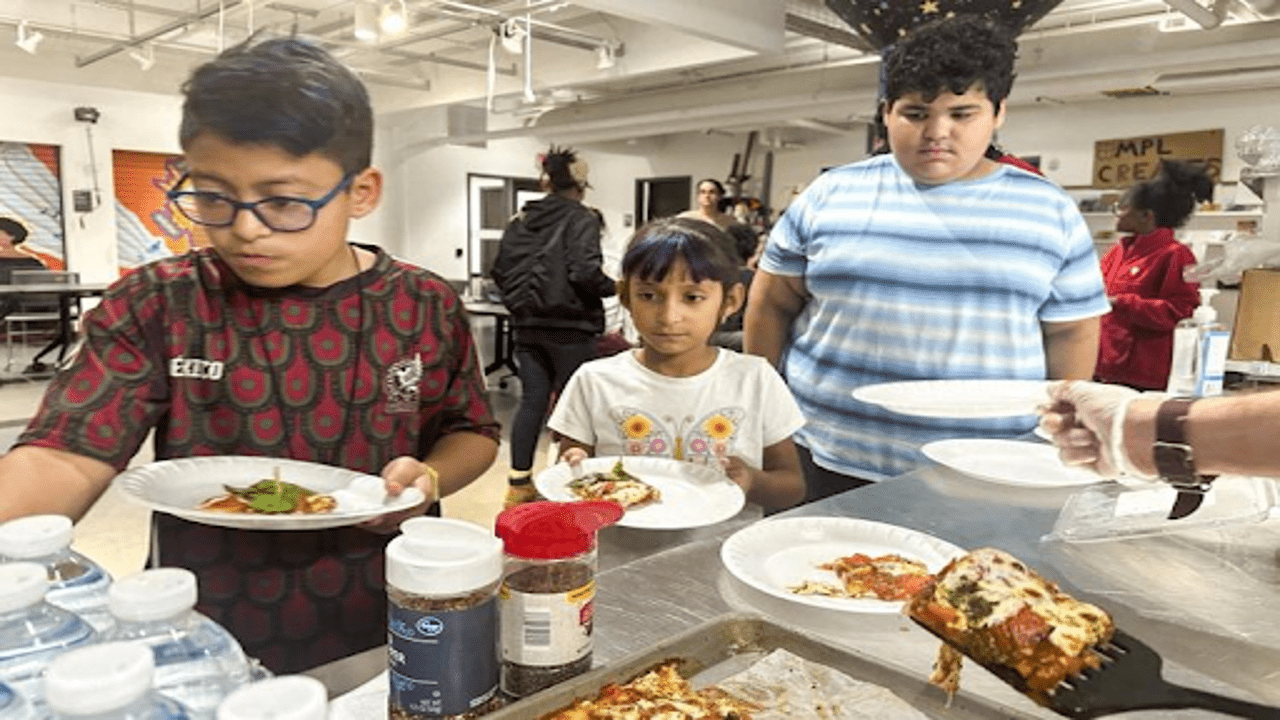
Attendees of the after school nutrition program, Milwaukee Public Library Snack Hack, lined up to get a slice of pizza made from scratch, Nov 19, 2024, Milwaukee. (Ap Photo/Devi sastri)
MILWAUKEE — In the bustling main hallway of the Milwaukee Public Library’s downtown branch, a team from Aurora Health Care’s Mobile Medical Clinic patiently waited at a table, offering free health advice to library visitors. With a blood pressure cuff and mental health questionnaires at the ready, they invited passersby to stop and ask questions. “Do you have any questions about your health?” they asked, sparking conversation.
On this particular afternoon, a man approached nurse practitioner Carolyn McCarthy with concerns about his joint pain. He explained that he had stopped taking his blood pressure medication, a calcium channel blocker, believing it interfered with his body’s calcium storage. McCarthy calmly explained how the medication worked, its importance, and reassured him that it wouldn’t affect his calcium levels. “Hopefully, he left feeling more informed,” McCarthy said.
This mobile clinic is just one example of how libraries across the U.S. are becoming hubs for community health. From small rural libraries to large urban systems, public libraries are offering services like fitness classes, food pantries, mental health support, and even check-outable blood pressure monitors. These programs utilize libraries’ reputation as trusted spaces for information and their ability to reach people who might not have access to formal healthcare settings. Best of all, these services are available without the need for insurance, ID, or even a specific language skill.
A blood pressure machine is being used in a library in Kansas City. (AP Photo/Nick Ingram)
Jaime Placht, a health specialist with the Kansas City Public Library, described libraries as “the last true public institution,” noting their unique ability to serve all people, regardless of background. Kansas City is home to several health-focused programs, including blood pressure stations that have been used over 13,000 times, and take-home kits that have been checked out almost 100 times since their introduction. According to Placht, many patrons have shared how these resources prompted them to visit a doctor for the first time in years.
In rural Jarrell, Texas, where there is no local public health office, the library plays a vital role in connecting community members to mental health services. The Jarrell Community Library and Resource Center, funded by the St. David’s Foundation, helps with everything from mental health support to end-of-life planning. Library director Susan Gregurek shared how conversations about topics like cremation services have led to expert-led educational sessions for the community. The library also provides resources for women seeking to file restraining orders, showing the broader role libraries play in mental health and well-being.
Nearby in Smithville, Texas, the local library participates in the Libraries for Health program, which provides food from local farmers and peer support for people dealing with isolation. Judy Bergeron, the library director, shared how funding has increased the library’s outreach, helping many people in the community who are struggling with health and social issues.
In Milwaukee, the mobile health clinic has been operating for a year and a half, visiting libraries and reaching an average of eight patrons per session. Some visitors have shared life-changing stories about seeking medical care after visiting the clinic, though McCarthy acknowledged that others, unfortunately, did not seek help in time. She described the service as “a Band-Aid on a broken health system.”
At the Mitchell Street branch in Milwaukee, a program teaching kids healthy eating habits has also taken off. Chef Sharrie Agee has been running a weekly after-school class since 2022, helping kids learn to prepare healthy snacks and introducing them to ingredients from around the world. One afternoon, young chefs helped Agee prepare a pizza, learning about the origins of the dish and its ingredients. Ruby Herrera, 40, attended the class with her children, eager to teach them how to cook nutritious meals at home. Her daughter, seven-year-old Yareni, proudly shared that she would make the pizza again at home and was excited to learn how to cook rice and beans next.
Through these efforts, libraries are proving that they’re not just places for books but also community health resources that make a tangible difference in the lives of those they serve.















